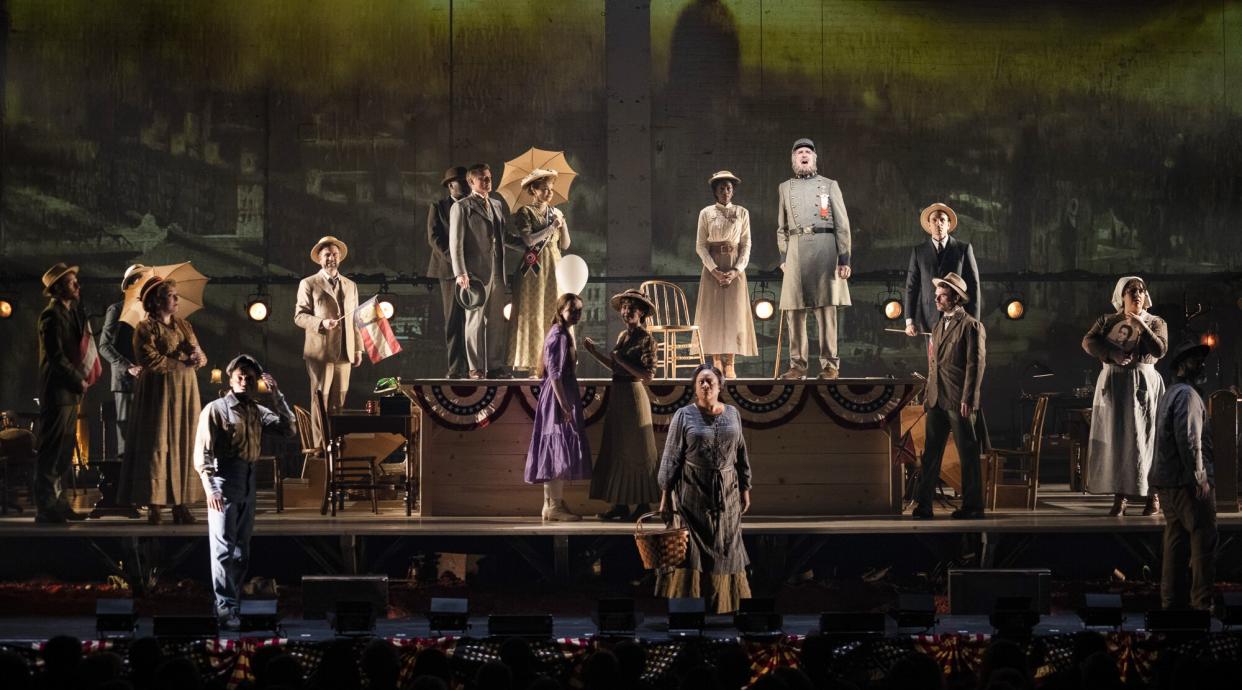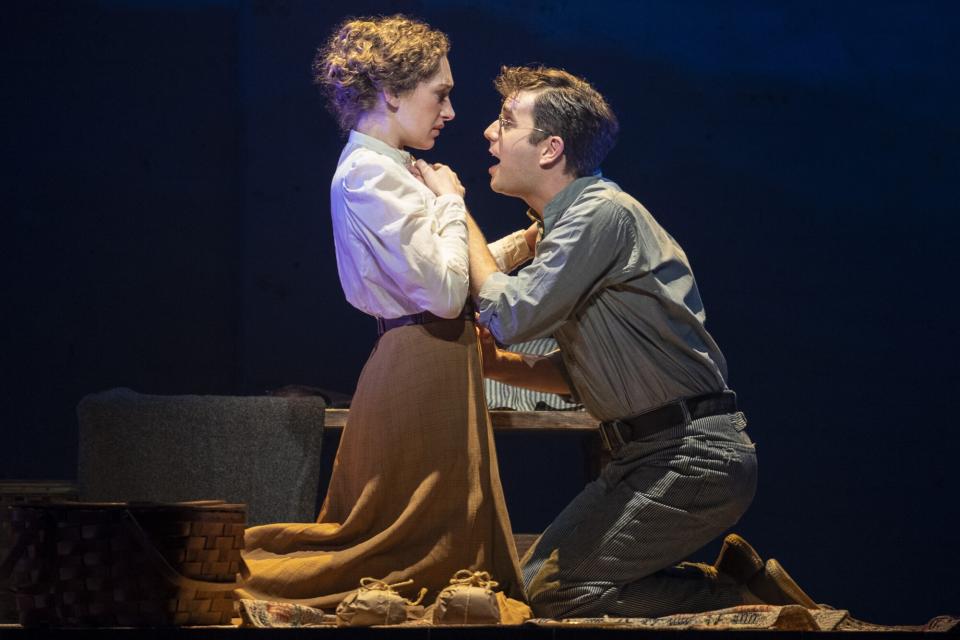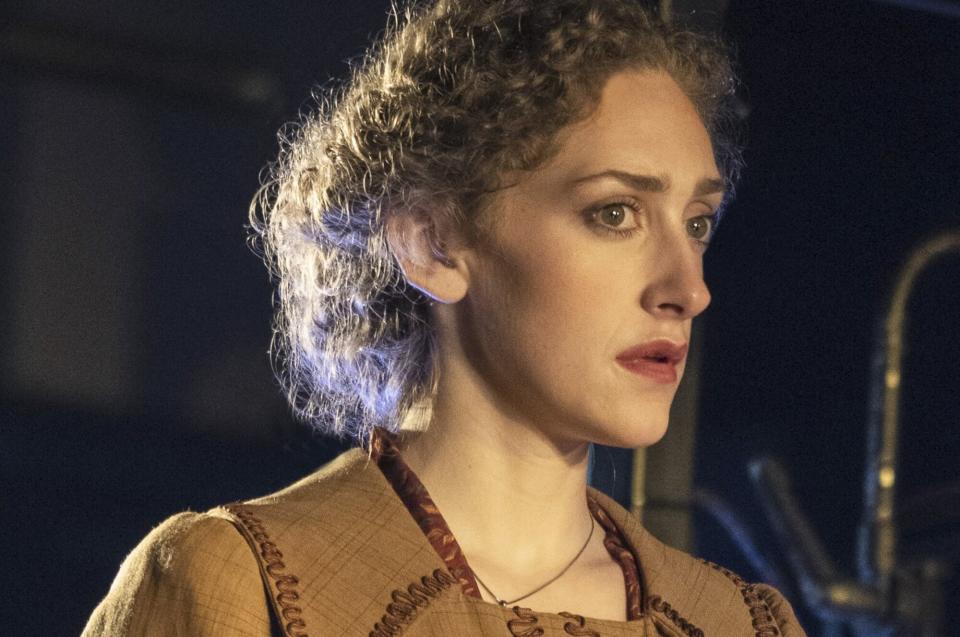Parade review: Ben Platt and Micaela Diamond shine in powerful and poignant Broadway revival

- Oops!Something went wrong.Please try again later.
- Oops!Something went wrong.Please try again later.
- Oops!Something went wrong.Please try again later.
- Oops!Something went wrong.Please try again later.
- Oops!Something went wrong.Please try again later.
Joan Marcus The company of 'Parade'
In a swathe of land near where Rosewell Road intersects Interstate 75 in Marietta, Ga., stands the memorial dedicated to Leo Frank, a Jewish man who was convicted of murdering 13-year-old Mary Phagan amid a rise in anti-Semitism in 1913. He was kidnapped from prison and lynched two years later. "Without addressing guilt or innocence," it reads, "and in recognition of the state's failure to either protect Frank or bring his killers to justice, he was granted a posthumous pardon in 1986."
The same monument is projected across the brick wall behind the stage when audiences step into the Bernard B. Jacobs Theatre each night to see Parade, Alfred Uhry and Jason Robert Brown's Tony award-winning musical that dramatizes Frank's trial and how government officials and local media played a role in his death. Following a celebrated sold-out string of performances at the New York City Center in November, the show, directed by Michael Arden (Spring Awakening), is returning to Broadway once again for the first time since its original 1998 run in a phenomenal production that feels more poignant and powerful than ever.
Plucked from his Brooklyn roots and deposited into the red hills of Georgia, Leo Frank (Tony Award winner Ben Platt) is a reserved, college-educated Jewish man who clings to his religious and geopolitical beliefs in a land that might as well be another planet. He finds little commonality with not only his new neighbors, but also his wife Lucille (the dazzling Micaela Diamond) and instead devotes himself entirely to the future and work as the superintendent of Atlanta's National Pencil Factory. On Confederate Memorial Day, Leo meets Mary Phagan (Erin Rose Doyle, making her Broadway debut). When she's found dead in the factory's basement, Leo is charged and later sentenced to death for her murder, kicking off a two-year legal battle that ends with his own demise. Through it all, Lucille struggles to decide whether to stand with her husband or the people of Georgia.

Joan Marcus Ben Platt in 'Parade'
Parade is much more than just a singular spectacle; it slowly and methodically highlights the ways in which Frank's tragedy isn't an isolated incident, but rather a cog in the wheel of injustice that continues to spin to this day. It can be seen in its corrupt politicians — Governor Slaton (Sean Allan Krill), prosecutor Hugh Dorsey (the viciously vibrant Paul Alexander Nolan), all the way down to local authorities (William Michals) — that select Frank as their scapegoat despite only circumstantial evidence linking him to the crime. Or how local editor Tom Watson (Manoel Felciano) and reporter Britt Craig (Jay Armstrong Johnson) profit off the town's bubbling hatred by demonizing Frank in the press, ultimately helping to push locals to commit unspeakable acts in the name of vengeance, religious extremism, and Southern nationalism. Throughout its two hour and thirty minute runtime, Parade revels in the moral ambiguity that it presents, and its outstanding 33-person ensemble dares one to inspect their own thoughts on due process and — despite its 1910s setting — see its present-day parallels, some of which are unfolding right outside its very stage door.
The revival also doesn't shy away from examining how race affected what would inevitably become a nationwide fervor surrounding Frank's case, with some advocating for his death and others maintaining his innocence. In one scene, Riley (Douglas Lyons) and Angela (Courtnee Carter), two of the Governor's housekeepers, imagine how the trial, and Frank's ongoing appeal process, might've played out had either parties involved been Black, singing, "They comin' now, yes-sir-ee! 'Cause a white man gonna get hung, you see."
The duo dance atop the musical's unique set, crafted by stage designer Dane Laffrey, which features a square, elevated stage that acts as a witness stand, gravesite, and dance floor, with pews flanking its sides that add another layer of religious connotation to its stripped-back courtroom. Meanwhile, projection designer Sven Ortel grounds Parade in a harrowing sense of authenticity with his use of newspaper headlines and historical portraits that eclipse the stage's back wall, some of which are so chilling that it felt as if the air had been sucked out of the entire theater when they were displayed.

Joan Marcus Micaela Diamond and Ben Platt in 'Parade'
In fact, Parade often manages to pull an emotional reaction out of its audience by suddenly twisting even its most beautiful moments into something far more menacing. When Mary is laid to rest, her childhood friends (all-stars Emily Rose DeMartino, Ashlyn Maddox, Sophia Manicone, and Jake Pedersen) mourn a sweet, young girl with crooked teeth that loved movies and cotton candy. However, it sours when Pedersen's Frankie Epps vows not to rest until Mary's killer is "burning in the ragin' fires of Hell forevermore."
Platt gives a constrained, yet compelling performance as Leo, a man who is not only literally fighting for his life, but also to preserve his own dignity. Despite his inward nature, Platt still finds moments within Uhry's script to dazzle and delight — he easily summons laughs from the audience with his snappy, dry wit, and his complete transformation into a fictionalized lecherous, toe-tapping tempter recounted during witness testimonies is seriously sinister — but it's during Leo's devastating statement on the witness stand, "It's Hard to Speak My Heart", that the actor truly shines. His earnest, lilting vocals, which pour out of him like water, are laced with a heartbreaking mixture of fear and sincerity that allows an extra level of insight into the mind of a man desperately attempting to control what little he can as greater forces plot against him.

Joan Marcus Micaela Diamond in 'Parade'
Diamond's Lucille is the perfect foil to her reserved husband and, truly, the heart of Parade. The 23-year-old actress brings a warmth to the role as she expertly shifts gears from an unfulfilled, passive housewife into a fiery, emboldened fighter that is able to get Governor Slaton to review — and later commute — Leo's death sentence. The loyalty, passion, and optimism that Diamond imbues within the character acts as a balm for both Leo and the audience alike during the couple's darkest moments. Her searing performance of "You Don't Know This Man," Lucille's verbal takedown of reporter Britt Craig in defense of her husband, is pure magic.
Combine them together and Platt and Diamond's chemistry is undeniable. Their voices blend beautifully in the uplifting anthem "This Is Not Over Yet," and their prison cell picnic is a bittersweet reprieve that sees both actors charmingly play off one another as their characters fall in love in the face of overwhelming adversity.
Add in the powerhouse vocals of Alex Joseph Grayson, who steals every single scene as the bombastic Jim Conley, the rich baritone of Eddie Cooper in his Broadway debut, and it's easy to see why Parade is the most gut-wrenchingly gorgeous production on Broadway. Grade: A
Related content:

